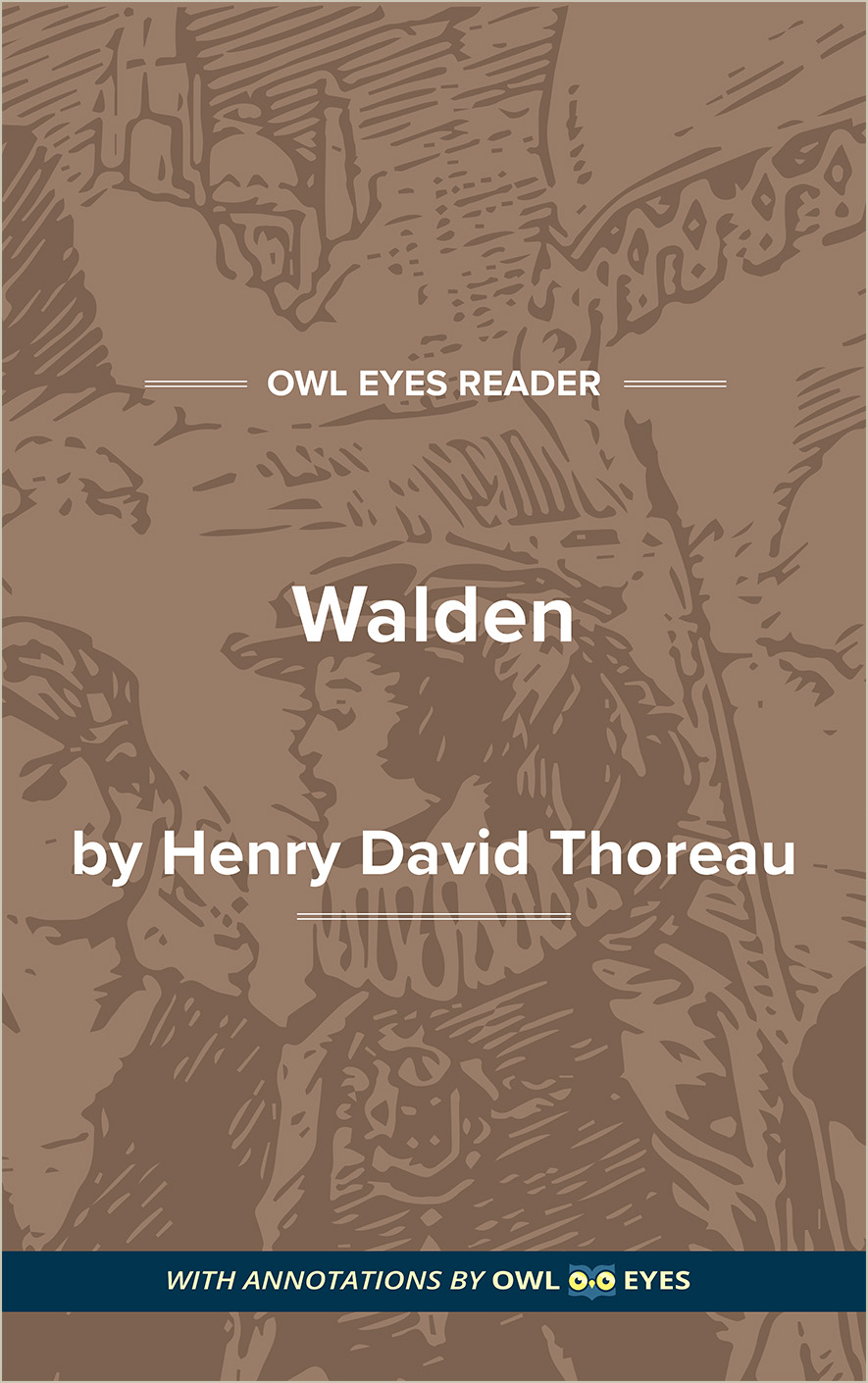Analysis Pages
Themes in Walden
Themes Examples in Walden:
Economy
🔒" be an azad, or free..." See in text (Economy)
"be an azad, or free man, like the cypress..." See in text (Economy)
"I would not subtract anything from the praise that is due to philanthropy, but merely demand justice for all who by their lives and works are a blessing to mankind..." See in text (Economy)
"If I were to preach at all in this strain, I should say rather, Set about being good..." See in text (Economy)
"In short, I am convinced, both by faith and experience, that to maintain one's self on this earth is not a hardship but a pastime, if we will live simply and wisely..." See in text (Economy)
"I found that, by working about six weeks in a year, I could meet all the expenses of living..." See in text (Economy)
"trumpery..." See in text (Economy)
"this being very nearly the means with which I started, and the measure of expenses to be incurred..." See in text (Economy)
"I set up the frame of my house..." See in text (Economy)
"The house is still but a sort of porch at the entrance of a burrow..." See in text (Economy)
"Shall we always study to obtain more of these things, and not sometimes to be content with less?..." See in text (Economy)
"I studied rather how to avoid the necessity of selling them..." See in text (Economy)
"voluntary poverty..." See in text (Economy)
"No way of thinking or doing, however ancient, can be trusted without proof..." See in text (Economy)
"Wilberforce..." See in text (Economy)
"When I wrote the following pages, or rather the bulk of them, I lived alone, in the woods, a mile from any neighbor, in a house which I had built myself, on the shore of Walden Pond, in Concord, Massachusetts, and earned my living by the labor of my hands only. I lived there two years and two months. At present I am a sojourner in civilized life again..." See in text (Economy)
"Our inventions are wont to be pretty toys, which distract our attention from serious things..." See in text (Economy)
"All men want, not something to do with, but something to do, or rather something to be...." See in text (Economy)
"A man who has at length found something to do will not need to get a new suit to do it in; for him the old will do, that has lain dusty in the garret for an indeterminate period..." See in text (Economy)
"With respect to luxuries and comforts, the wisest have ever lived a more simple and meagre life than the poor..." See in text (Economy)
"The mass of men lead lives of quiet desperation...." See in text (Economy)
"What a man thinks of himself, that it is which determines, or rather indicates, his fate...." See in text (Economy)
Where I Lived, and What I Lived For
🔒"dead reckoning..." See in text (Where I Lived, and What I Lived For)
"I know of no more encouraging fact than the unquestionable ability of man to elevate his life by a conscious endeavor..." See in text (Where I Lived, and What I Lived For)
"itself an Iliad and Odyssey in the air, singing its own wrath and wanderings..." See in text (Where I Lived, and What I Lived For)
"The morning wind forever blows, the poem of creation is uninterrupted; but few are the ears that hear it..." See in text (Where I Lived, and What I Lived For)
"Such was not my abode, for I found myself suddenly neighbor to the birds..." See in text (Where I Lived, and What I Lived For)
"As long as possible live free and uncommitted. It makes but little difference whether you are committed to a farm or the county jail..." See in text (Where I Lived, and What I Lived For)
"I found thus that I had been a rich man without any damage to my poverty..." See in text (Where I Lived, and What I Lived For)
"but to my eyes the village was too far from it...." See in text (Where I Lived, and What I Lived For)
The Village
🔒""You who govern public affairs, what need have you to employ punishments? Love virtue, and the people will be virtuous. The virtues of a superior man are like the wind; the virtues of a common man are like the grass—the grass, when the wind passes over it, bends."..." See in text (The Village)
Higher Laws
🔒""How happy's he who hath due place assigned To his beasts and disafforested his mind! . . . . . . . Can use this horse, goat, wolf, and ev'ry beast, And is not ass himself to all the rest! Else man not only is the herd of swine, But he's those devils too which did incline Them to a headlong rage, and made them worse."..." See in text (Higher Laws)
Conclusion
🔒"If a man does not keep pace with his companions, perhaps it is because he hears a different drummer...." See in text (Conclusion)
"the source of the Nile, or the Niger, or the Mississippi, or a Northwest Passage..." See in text (Conclusion)

